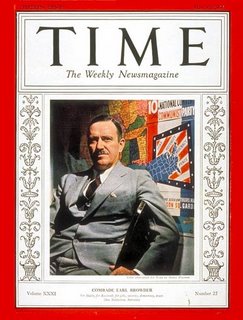From
Wikipedia :
Browder was born in Wichita, Kansas. He joined the Socialist Party of America at the age of 15. During World War I he gave speeches urging the United States not to join the war, calling the conflict an imperialist conflict. When the US joined the war in 1917, Browder and other Socialist Party leaders were arrested and charged under the Espionage Act for opposing conscription. Browder was imprisoned but continued to campaign against the war after his release resulting in his second imprisonment in 1919.
The left wing of the Socialist Party split to form the Communist Party of America and the Communist Labor Party. The two parties fused in 1921 and Browder joined the unified party in 1921 becoming managing editor of the party newspaper, Labor Herald.
In 1928, Browder and his lover Kitty Harris went to China and lived together in Shanghai where they worked together on behalf of the Pan-Pacific Trade Union Secretariat, a Comintern organization engaged in clandestine labor organizing. The two returned to the United States in 1929.
CPUSA leadership
Browder became general secretary of the Communist party in 1930 and took over the top position of party chairman in 1932 after William Z. Foster suffered a heart attack.
Foster was the party's candidate for President of the United States in the 1936 presidential election but won only 80,195 votes. He tried to run for President in the 1940 presidential election but was forbidden by a court order from travelling around the country and won only 46,251 votes.
Browder was sentenced to prison in 1940, ostensibly due to passport violations, but was released after 14 months when the US joined World War II and became an ally of the Soviet Union. Browder embraced the popular front tactic and led the CPUSA's tactic of expressing cautious support for the New Deal of Franklin Delano Roosevelt while demanding that it should go much further than it did.
In 1944, Browder declared that communism and capitalism could peacefully co-exist. The Communist Party reconstituted itself as the Communist Political Association. With the end of the Great Power alliance at the end of World War II and the beginning of the Cold War, "Browderism" came under attack from the rest of the international Communist movement. In 1945, Jacques Duclos, a leader of the French Communist Party, published an article denouncing Browder's policy. With the Comintern having been dissolved during the war, the "Duclos letter" was used to informally communicate Moscow's views. William Z. Foster, Browder's predecessor and a staunch Stalinist, led the opposition to Browder within the party and replaced him as party chairman in 1945, with Eugene Dennis taking over as general secretary. Browder was expelled from the party in 1946.
Post-expulsion
Browder continued to campaign for his views outside the party and criticized the CPUSA's domination by Moscow, writing that "The American Communists had thrived as champions of domestic reform. But when the Communists abandoned reforms and championed a Soviet Union openly contemptuous of America while predicting its quick collapse, the same party lost all its hard-won influence. It became merely a bad word in the American language." [citation needed]
In April 1950, Browder was called to testify before a Senate Committee investigating Communist activity. Questioned by Joseph McCarthy, Browder was willing to criticize the American Communist Party but refused to answer questions that would incriminate former comrades. Charged with contempt of Congress, Judge F. Dickinson Letts ordered his acquittal because he felt the committee had not acted legally.
Browder's final public appearance was in a debate with Max Shachtman, the dissident Trotskyist, in which the pair debated socialism. Browder defended the Soviet Union and Stalinism while Shachtman acted as a prosecutor. It is reported that at one point in the debate Shachtman listed a series of leaders of various Communist Parties and noted that each had perished at the hands of Stalin; at the end of this piece of theatre, he remarked that Browder too had been a leader of a Communist Party and, pointing at him, announced: "There-there but for an accident of geography, stands a corpse!"
An attempt to reinstate Browder in the CPUSA following the Twentieth Party Congress and the move to destalinization failed. He remained outside of the party until his death in Princeton, New Jersey in 1973.

In addition to the above information, those who deviated from the Soviet line in Czechoslovakia where labeled Bowderists. In the last few years of his life Browder became a nihilist and died basically alone.
He did, however contribute significantly to the history of the American left.

1 comment:
Ah Kansas, Kansas... where did you go so astray!
Post a Comment